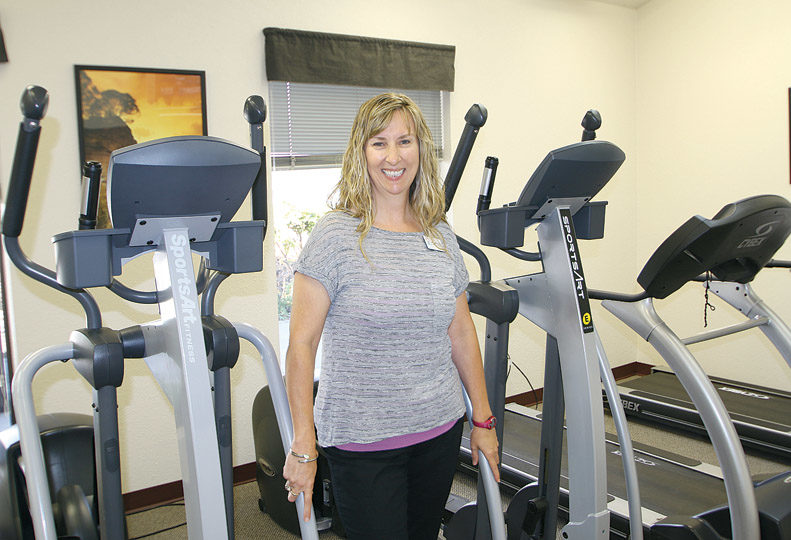
Home » Apex Therapy grows in its incontinence treatment
Apex Therapy grows in its incontinence treatment
All clinics soon will have gynecology therapists

July 28, 2016
Here’s how Amy Sanderson, a certified pelvic-floor practitioner for Apex Physical Therapy, describes how she finds satisfaction in the work that she does, helping treat women battling urinary incontinence.
“At the end of treatment, my patient came in and asked me, ‘Do you notice anything different about me?’’’ says Sanderson, who admitted to her former patient that she didn’t.
“She finally said, ‘I’m wearing white pants. I haven’t worn white pants in years,’’’ she says.
The pelvic floor is the grouping of muscles at the base of the pelvis that can suffer physical damage or become stressed through mental or emotional trauma, Sanderson says.
Incontinence man-agement affects nearly one in five women following childbirth and 30 percent of women following menopause.
The most common types include stress incontinence—the involuntary loss of urine during physical exertion—and urge incontinence, which is the loss of urine that is preceded by a strong urge to urinate.
Apex Physical Therapy offers a wide range of therapy services, some of which include treatment for arthritis, rehabilitation from auto collisions and sports-related injuries, prostate treatment, and obstetrical physical therapy.
Neal Blakely and Robert Paull co-founded Apex, and opened its first location in August 1996 at 1111 E. Westview, in north Spokane.
Blakely, Paull, and Sanderson, who was then a recent Eastern Washington University graduate, previously worked together for a physical therapy clinic that once operated in Cheney.
Not long after starting Apex, Blakely and Paull asked Sanderson to launch a clinic in Cheney and develop a “women’s health program,” Sanderson says.
“It’s morphed into something I never imagined,” she says.
Apex now operates in four locations in the Spokane area.
Sanderson works in the Cheney clinic at 1855 First Street, which she helped start in 1998 in 4,000 square feet of space.
Its other clinics are in Airway Heights, at 12721 W. 14th, and along Interstate 90 in the Fairways Plaza, at 10511 W. Aero Road, also on the West Plains.
Three of the four Apex sites offer gynecological services for women, with Sanderson being the senior-most therapist offering services. Apex practice manager Peggy Craig says Sanderson provided pelvic-floor treatment to 274 women last year.
Other physical therapists for Apex providing gynecological therapy services include Christy Frazier, at the North Side location, and Tracy Kuhn, in the Fairways Plaza office. In August, Julia Kelley Salazar will start working as a therapist at the Airway Heights clinic, Craig says.
Apex therapists provide services for the treatment of incontinence management, and obstetrical physical therapy services related to pain and soreness after pregnancy-related surgery.
Apex opened its Airway Heights office in 2007 and the Fairways Plaza location last year in response to growing demand, she says.
The Spokane clinic is the largest of the four, occupying 5,500 square feet, says Sanderson.
Apex has a total of 39 employees across all four sites with the largest number—18—working at the North Side location.
In 2015, Apex provided services to 28,000 clients, an increase from 23,500 tduring the previous year, Craig says.
“We’re certainly seeing a growth in request for service,” she says. “As the practice manager, what I hear from the therapists and patients is that they appreciate the fact each patient receives 45-minute, one-on-one treatments,” Craig says.
“Spending that amount of time gives therapists the opportunity to get to know the patients and their needs,” Craig says.
Sanderson became a physical therapist in 1993 after earning her undergraduate degree from EWU.
She’s been actively involved in the American Physical Therapy Association, as well as the Washington State Physical Therapy Association, serving on committees and holding an office position for the Washington State Physical Therapy Political Action Committee.
Sanderson is board certified in orthopedics and has developed a pelvic-floor program for men, women, and children, though the majority of her patients are women.
“I work with patients on strengthening their core. Core muscle strength is central to improving the condition of the pelvic floor,” she says.
Sanderson works 10 hours a day, Monday through Thursday. She estimates she sees on average from three to five women daily suffering from incontinence.
Pelvic floor exercises, such as Kegels—an exercise that involved the contracting and relaxing of the muscles that form the pelvic floors foundation—can reduce urinary stress incontinence many women experience after childbirth and reduce premature ejaculatory occurrences in men, Sanderson says.
Sanderson says the most effective form of treatment she can offer her patients is education about incontinence and showing them a series of pelvic floor exercises they can use at home.
“It really doesn’t take long to treat. Typically, what I see is that after at least four visits to the clinic over an eight-week span, a patient begins to experience an 80 percent to 100 percent improvement,” she says.
Latest News Up Close Health Care
Related Articles
Related Products



